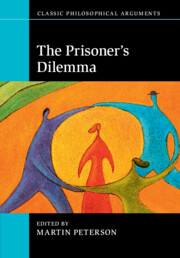Book contents
- Frontmatter
- Contents
- List of contributors
- Introduction
- 1 Why all the fuss? The many aspects of the Prisoner's Dilemma
- 2 How I learned to stop worrying and love the Prisoner's Dilemma
- 3 Taking the Prisoner's Dilemma seriously: what can we learn from a trivial game?
- 4 Prisoner's Dilemma doesn't explain much
- 5 The Prisoner's Dilemma and the coevolution of descriptive and predictive dispositions
- 6 I cannot cheat on you after we talk
- 7 Prisoner's Dilemma cannot be a Newcomb Problem
- 8 Counterfactuals and the Prisoner's Dilemma
- 9 The Tragedy of the Commons as a Voting Game
- 10 The role of numbers in Prisoner's Dilemmas and public good situations
- 11 The inner struggle: why you should cooperate with people you will never meet again
- 12 Prisoner's Dilemmas, intergenerational asymmetry, and climate change ethics
- 13 Prisoner's Dilemma experiments
- 14 The lesson of the Prisoner's Dilemma
- Bibliography
- Index
14 - The lesson of the Prisoner's Dilemma
Published online by Cambridge University Press: 05 July 2015
- Frontmatter
- Contents
- List of contributors
- Introduction
- 1 Why all the fuss? The many aspects of the Prisoner's Dilemma
- 2 How I learned to stop worrying and love the Prisoner's Dilemma
- 3 Taking the Prisoner's Dilemma seriously: what can we learn from a trivial game?
- 4 Prisoner's Dilemma doesn't explain much
- 5 The Prisoner's Dilemma and the coevolution of descriptive and predictive dispositions
- 6 I cannot cheat on you after we talk
- 7 Prisoner's Dilemma cannot be a Newcomb Problem
- 8 Counterfactuals and the Prisoner's Dilemma
- 9 The Tragedy of the Commons as a Voting Game
- 10 The role of numbers in Prisoner's Dilemmas and public good situations
- 11 The inner struggle: why you should cooperate with people you will never meet again
- 12 Prisoner's Dilemmas, intergenerational asymmetry, and climate change ethics
- 13 Prisoner's Dilemma experiments
- 14 The lesson of the Prisoner's Dilemma
- Bibliography
- Index
Summary
The Prisoner's Dilemma teaches many lessons about individuals interacting. A very prominent lesson, the one I treat and call its lesson, concerns standards of rationality. This lesson reveals profound points about the relationship between rationality's standards for individuals and its standards for groups.
14.1 Rationality
Rationality is a normative and evaluative concept. Agents should act rationally, and their acts, if free, are evaluable for rationality. Rationality considers an agent's abilities and circumstances before judging an act. Because rationality recognizes excuses, acting irrationally is blameworthy. If an agent has an excuse for a defective act so that the act is not blameworthy, then it is not irrational. These points pertain to the ordinary, common conception of rationality, which I use, rather than a technical conception that offers precision but has less normative interest.
A general theory of rationality with explanatory power covers rational action in possible worlds besides the actual world. A model for a theory of rationality constructs a possible world with features that control for factors in the explanation of a rational choice. For instance, a model may specify that agents are fully informed despite agents' ignorance in the actual world. A model's assumptions may be either idealizations or just restrictions. An idealization states a condition that promotes realization of goals of rationality, which rational agents want to attain, such as making informed choices. Because an idealization facilitates attaining a rational agent's goals, rational agents want its realization too. For example, because a rational agent wants to make informed choices, she also wants to gather information. Full information about relevant facts is thus an ideal condition for a decision problem. In contrast, a mere restriction states a condition that does not promote goals of rationality but may simplify explanations of rational action. For example, that an agent has a linear utility function for amounts of money is a restriction rather than an idealization because a rational agent need not want to have such a utility function either as a goal or as a means of attaining a goal of rationality.
- Type
- Chapter
- Information
- The Prisoner's Dilemma , pp. 265 - 281Publisher: Cambridge University PressPrint publication year: 2015
- 1
- Cited by

